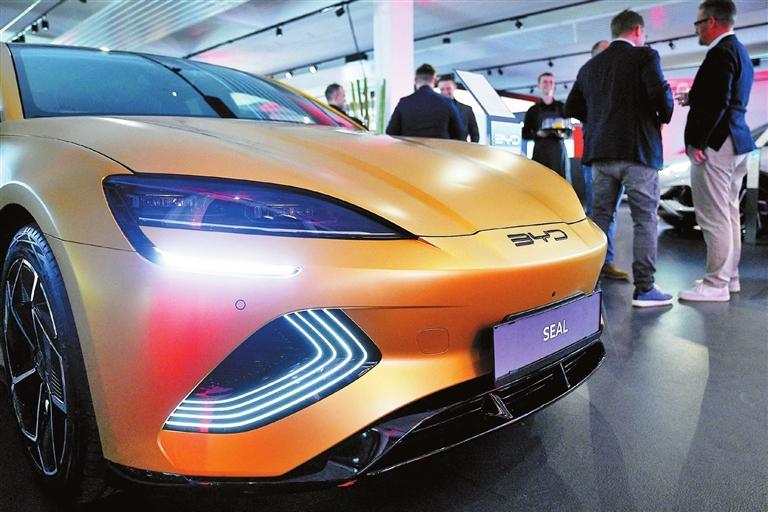
Yang Yunfei 1017800664@qq.com BYD Co., the world’s largest maker of new energy vehicles that include plug-in hybrids, battery electric cars and fuel cell cars, could see its plans to make inroads in Mexico hit possible roadblocks after a U.S. manufacturing trade group has urged the Biden administration to block imports of Chinese automakers’ products made in Mexico that it says could threaten the viability of American car companies. BYD, once relatively unknown outside China and even scoffed at by Tesla Inc. CEO Elon Musk in a Bloomberg TV interview in 2011, knocked Tesla off the top spot as the world’s best-selling electric vehicle (EV) maker for the first time in the last quarter of 2023. For 2023, BYD notched total annual sales of exceeding 3 million units, which also include plug-in hybrid cars, outpacing Tesla’s sales of 1.8 million electric cars. BYD’s success in chasing down Tesla, the longtime, market-leading pioneer, reflects the rapid rise of what was a little known Chinese firm only a decade ago. But growth at the Shenzhen-based company has been mostly achieved on its home turf despite its fast-growing overseas sales recently. Historically, 85% to 90% of BYD’s revenues were generated from the domestic market. The firm’s exports more than quadrupled to 242,765 vehicles in 2023, accounting for 8% of its sales. With rising competition in China, BYD is now ramping up efforts to go global by building new plants overseas in addition to expanding exports from China. The Nikkei quoted Zou Zhou, country manager of BYD Mexico, as saying Feb. 14 that BYD is planning to set up a new manufacturing plant in Mexico as the electric vehicle maker aims to establish an export hub to the United States. According to the Nikkei report, BYD has launched a feasibility study for the Mexican plant and is currently negotiating with officials over terms, including the factory’s location. “Overseas production is indispensable for an international brand,” Zou told the Nikkei. But the Alliance for American Manufacturing said in a report Friday that the United States should work to prevent automobiles and parts manufactured in Mexico by Chinese companies from benefiting from a North American free trade agreement. Under the United States-Mexico-Canada Agreement (USMCA), which entered into force July 1, 2020 to replace the North America Free Trade Agreement, each passenger vehicle must be produced with 75% of parts sourced from within North America to avoid tariffs. Chinese-made electric vehicles are currently subject to a 25% tariff in the United States, which goes atop a 2.5% tariff on imported cars. That’s prevented Chinese carmakers from making significant inroads into the country. BYD, for example, does not sell any of its passenger cars in the United States due to the steep import duties of 27.5%. Manufacturing in Mexico, however, could change the equation. Mexico, the world’s seventh-largest carmaking nation, offers cheaper labor, a broad-based car supply chain and access to the North American free trade deal USMCA. Sales of Chinese cars jumped 63% year on year to a new record of 129,329 units last year in Mexico, according to the Mexican Association of Automobile Distributors. With 11 Chinese brands now sold in the country, Chinese automakers claimed 19.5% of Mexico’s market in 2023. Hoping to gain a valuable foothold in the region, some Chinese carmakers are building manufacturing footprint in Mexico, which can serve as an entry point for manufacturing and exporting into North America. Anhui Jianghuai Automobile Group Corp. is currently the only Chinese car company with an assembly plant in the country. In September, Stella Li, BYD executive vice president, told Mexican news outlet El Sol de Mexico that the company was considering building a factory in the country, though it would depend on market demand. “If we see that there is a high demand, we will consider producing the vehicles here,” Li was quoted as saying. BYD met ministers from at least four Mexican states, including Edomex and Yucatan, in November at a reception in Mexico City about an electric vehicle factory, the Financial Times quoted a former state official as saying in a December report. BYD has already been operating in Mexico for 10 years, mainly with the sale of more than 500 electric trucks for companies such as Femsa, Lala and Bimbo. “The commercial backdoor left open to Chinese auto imports should be shut before it causes mass plant closures and job losses in the United States,” the Alliance for American Manufacturing said in its report Friday. The U.S. group’s rhetoric is the latest amid a wave of protectionist measures against Chinese EVs in the country. In November, a bipartisan group of U.S. lawmakers urged the Biden administration to hike tariffs on Chinese-made vehicles and investigate ways to prevent Chinese companies from exporting to the United States from Mexico. U.S. concerns over Chinese carmakers’ investment into Mexico come as it is vying with China for supremacy in EV manufacturing. Joe Biden’s administration has also introduced the Inflation Reduction Act to exclude EVs, batteries and other components and resources made by Chinese companies from its supply chain. China is the world’s largest EV producer and Chinese firms shipped more than 1.2 million new energy vehicles to the rest of the world last year, up 77% from 2022, according to data from the China Association of Auto Manufacturers. The country exported more than 443,000 automobiles in January, a 47.4% increase from 2023, according to data from the association. China contributed to the global effort toward low-carbon transformation, as one out of every three vehicles exported by the country is an EV, Mao Ning, a spokesperson of China’s Ministry of Foreign Affairs, said at a regular press conference Feb. 20 in response to the United States trying to limit EV imports from China. The protectionist measures employed by “related countries” are “dragging down progress and prosperity of the world,” she said. | 
